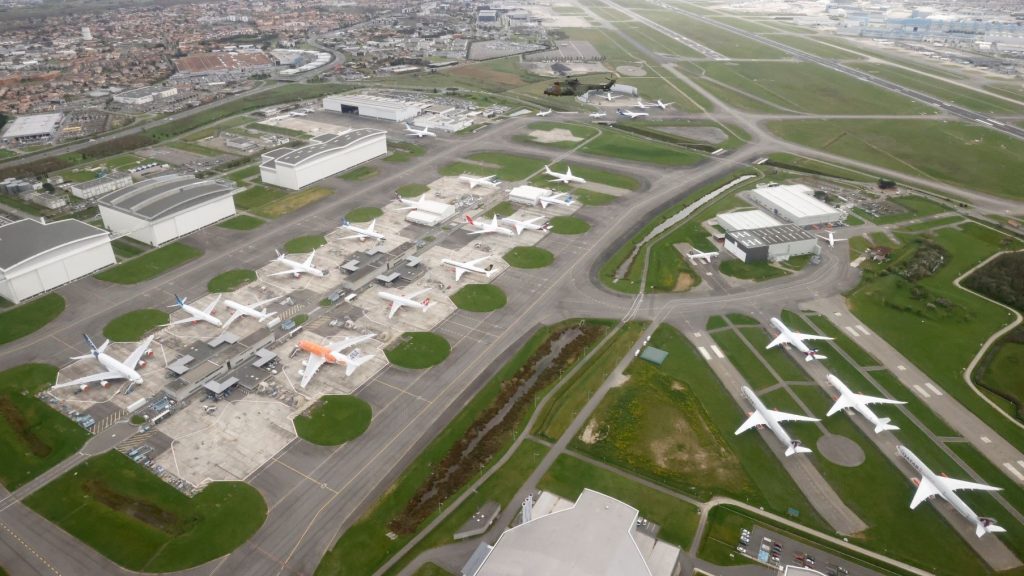
Britain is asking countries to push for a global target to cut aviation emissions to levels compatible with the Paris Agreement, under a deal due to be announced at the COP26 climate change summit, according to a draft document seen by Reuters.
As COP26 host, Britain is rallying countries to join an “International Aviation Climate Ambition Coalition” and agree to push the United Nations’ aviation agency to set a long-term target to reduce emissions from international flights.
Countries that sign the deal would commit to supporting the adoption by the UN’s International Civil Aviation Organization (ICAO) of an “ambitious long-term aspirational goal that is compatible with net-zero global emissions by 2050”, the draft said.
The aim is to build momentum for ICAO to set tougher climate targets when its nearly 200 member countries meet in September 2022.
The Paris Agreement does not explicitly address international aviation emissions, but commits countries to limit global temperature increases to 2C this century and aim for 1.5C.
To meet the 1.5C goal, which would avoid the worst impacts of climate change, scientists say combined global CO2 emissions from all sectors would need to be reduced to net zero by 2050.
Montreal-based ICAO is facing pressure to toughen its climate goals. U.N. Secretary-General Antonio Guterres this month blasted the agency’s plans as too weak and urged it to set “more ambitious and credible targets”.
“Current commitments are not aligned with the 1.5-degree goal of the Paris Agreement. In fact, they are more consistent with warming way above 3 degrees,” Guterres said, referring to both ICAO and the U.N shipping agency’s climate aims.
ICAO sits at the centre of a global system of widely agreed norms, but is not a regulator in its own right.
The U.K.-led declaration would also commit countries to try to “strengthen” ICAO’s flagship scheme for addressing international aviation emissions, known as CORSIA.
The U.K. government did not immediately respond to a request for comment.
An ICAO spokesman said it “encourages all initiatives by states to enhance the sustainability of their aviation sectors”.
The draft did not specify which countries would join the coalition, but it said the United States had been involved in the talks.
“A broad range of states in other world regions have been contacted to sign the declaration, with some positive responses,” it said.
The U.S. Department of Transportation did not respond to a request for comment.
Global airlines agreed a net-zero 2050 goal in Boston earlier this month. But in what is widely seen as a dry run for efforts to reach a matching political deal at ICAO, China’s state-owned airlines argued against the airline target.
“If Brazil, Russia, India or China signed on to it, that would be a very big deal,” said a source familiar with the U.K.’s efforts, who spoke on condition of anonymity. “It would make it far more likely to get a good deal at the (ICAO) assembly.”
Officials from the 27 European Union countries will consider signing the declaration on Thursday. The European Commission could not immediately be reached for comment.
SIDE DEALS
The so-called coalition is one of a set of deals Britain is trying to strike among clusters of countries at the U.N. climate summit, which runs from Oct. 31 to Nov. 12 in Glasgow, Scotland.
Each one will address a key cause of planet-warming emissions – such as burning coal, or deforestation – and attempt to bring it in line with the deep emissions cuts needed to limit temperature increases to 1.5C.
Some campaigners said the draft aviation deal was a positive step, but warned that voluntary targets were no substitute for binding regulations to curb pollution from flights.
“A target doesn’t mean anything if you don’t have a policy to enforce it,” said Transport & Environment aviation manager Jo Dardenne.
Gilles Dufrasne, policy officer at Carbon Market Watch, said the draft deal had “several good elements” but did not oblige countries to address international aviation in their national climate targets.
An ICAO target, while not binding, would aim to push governments to take action to clean up the sector, like funding the production of sustainable aviation fuels. Low-carbon fuels are seen as crucial to cut emissions from flights, but their uptake has been hampered by factors including sky-high costs.
Many countries do not include emissions from international flights in their national climate targets, although some are planning tougher policies.
The EU is negotiating proposals to end tax exemptions for jet fuel and force suppliers to blend low-carbon fuels into their kerosene. Britain has said it will start counting international aviation emissions in its national carbon budgets.
(Reporting by Kate Abnett, Allison Lampert; additional reporting by Valerie Volcovici, William James; editing by Tim Hepher and Nick Macfie)